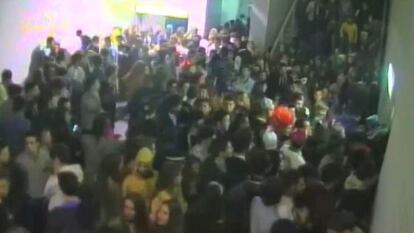“I have a problem. I have to leave at 5am, whatever happens”
Conversations between impatient police chief and duty officer initially ruled out stampede Recordings reveal attribution of reports of cardiac arrests to ingestion of alcohol and drugs


Conversations on the night of the Madrid Arena tragedy last November between the highest-ranking Municipal Police chief on duty at the time, Cándida Jiménez, and the duty officer at the 092 emergency switchboard of the same unit, have revealed delays, confusion and buck-passing with regard to the response of the emergency services.
Tragedy struck at the Halloween party, after a human avalanche formed in one of the corridors of the overcrowded event, which resulted in the deaths of five young women – three on the site, and two later in hospital.
According to the recordings, to which EL PAÍS has had access, Jiménez initially dismissed reports of a crush at the dance music event.
The first call placed to the 112 emergency number was from an officer stationed at the venue, who told the operator that someone had suffered a cardiac arrest. “We need another ambulance at Madrid Arena,” the audibly worried officer said. “Send another, send another.”
They also think the drugs may have been mixed with something else"
The next call was placed directly to M-9, Jiménez’s code, asking the police chief to come to Madrid Arena urgently. “I’m a little far away,” she replied. “If it’s a breathing problem…” The officer stressed the situation was “extremely serious.” Jiménez then said that she had been told by the SAMUR emergency services there had been no human avalanche but that the two reported cases of cardiac problems at that point had been reported by a fire chief to have been caused by “a mix of drugs and alcohol. They also think the drugs may have been mixed with something else.”
The time was now 4.46am on the morning of November 1 and the extent of the tragedy was beginning to become apparent as more emergency medical services arrived at the scene. In the meantime, Jiménez still declined to attend: “At the moment, no, I prefer to talk by telephone because I have a problem: at 5.30am I have to leave, whatever happens. Let’s see if we can talk afterward.”
Shortly before 5am, the chief of the National Police emergency call center in Madrid called his opposite number at the municipal call center to request a report on what was happening at Madrid Arena, despite the fact that the national corps was supposed to have a presence at the building. “There has been a big party in a building in Casa de Campo that is being controlled by private security. We are outside and there is overcrowding and excessive ingestion of alcohol, which has resulted in several interventions by SAMUR at the scene. This is, roughly speaking, what is happening,” the municipal chief says. The National Police chief then asks if there have been any fatalities: “No, man, no,” comes the reply, despite the deaths of two people having been reported by that stage. “SAMUR confirmed that there have been five or six cardiac arrests due to ingestion of alcohol or something like that. They’ve just told me one person has died. The other is OK. It was a cardiac arrest. There were no stampedes.”
Fifteen minutes later, Jiménez maintained that “of course nobody has died. We are not aware of it. Get one of ours to go in there and ask again because here we never know what’s going on.” Jiménez is then informed that two people have died. “Who told you that?” she asks angrily. When told that SAMUR provided the information, she responds: “I spoke to them 10 minutes ago and they said no. At some point we’ll find out what has happened. CNP [the National Police] have gone in and said there is a public health problem; we’re waiting to find out what happened.”
Jiménez is due to appear in court as part of the inquiry into the Madrid Arena tragedy on May 9.
Tu suscripción se está usando en otro dispositivo
¿Quieres añadir otro usuario a tu suscripción?
Si continúas leyendo en este dispositivo, no se podrá leer en el otro.
FlechaTu suscripción se está usando en otro dispositivo y solo puedes acceder a EL PAÍS desde un dispositivo a la vez.
Si quieres compartir tu cuenta, cambia tu suscripción a la modalidad Premium, así podrás añadir otro usuario. Cada uno accederá con su propia cuenta de email, lo que os permitirá personalizar vuestra experiencia en EL PAÍS.
¿Tienes una suscripción de empresa? Accede aquí para contratar más cuentas.
En el caso de no saber quién está usando tu cuenta, te recomendamos cambiar tu contraseña aquí.
Si decides continuar compartiendo tu cuenta, este mensaje se mostrará en tu dispositivo y en el de la otra persona que está usando tu cuenta de forma indefinida, afectando a tu experiencia de lectura. Puedes consultar aquí los términos y condiciones de la suscripción digital.








































